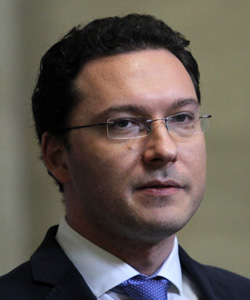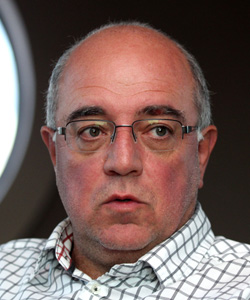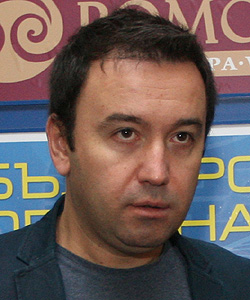At the insistence of Poland, Lithuania, Latvia and Estonia NATO is to deploy 4 infantry divisions to its Eastern Wing, in order to be better prepared against possible Russian aggression. Undoubtedly, we are responding to Russia's actions in Ukraine, because prior to the illegal annexation of Crimea no one was talking about such military presence, NATO Secretary General Jens Stoltenberg pointed out. Bulgaria has not demanded additional infantry forces, Bulgaria's Minister of Defense Nikolay Nenchev told the Bulgarian National Radio. However, there isn't any doubt that Bulgaria is now a venue of a world hybrid war which erupted after the Ukrainian crisis. The participants at the international round table in Sofia organized by the European Council on Foreign Relations united around that thesis, too.
The term hybrid war is relatively new, but such methods date back to the ancient history. The Romans used methods of hybrid war in the Battle for Cartagena and during the WW1 the German Reich was secretly supporting…Lenin. Nowadays the political experts and military strategists view hybrid war as pursuit of strategic goals through open and secret operations, diplomatic pressure, economic compulsion, misinformation campaigns and cyber attacks. One such example is the interruption of gas supplies to given countries and provision of financing to media for propaganda purposes. The hybrid war will be the topic of the future, a high-standing NATO General, who decided to stay anonymous, said on the eve of the Warsaw summit in July.
The annexation of Crimea and the violation of international agreements by Russia resulted in the imposition of many sanctions against Moscow, followed by Russian counter sanctions and increased Anti-Western propaganda. Bulgaria's President Rossen Plevneliev held a sharp speech from the rostrum of the European Parliament and warned that Russia was aiming at destabilizing the EU. Plevneliev pointed out that the Ukrainian crisis laid the foundation of a period of a cold peace. The years of the Cold War are still remembered with a strong propaganda from both sides of the Iron Curtain.
 Bulgaria's Minister of Foreign Affairs Daniel Mitov said that those times are almost back again.
Bulgaria's Minister of Foreign Affairs Daniel Mitov said that those times are almost back again.
“The cultivation of genetically modified information products and their implantation in people's minds is part of the new methods of the old conflict between the East and the West and Central and Eastern Europe has become a venue of that conflict. Russia has been repeatedly pointing out that it would not allow its civilizational colonization. The problems Europe has been recently facing often outrun the readiness of the European states to deal with them. Recently we have been witnessing growing populism of the nationalistic parties. The so-called Brexit phenomenon is a red lamp which signals about increased discontent in the EU. That is why Europe needs more than ever to take urgent and common decisions. Europe should take the right, rather than the popular decisions.”
The EU would definitely make a mistake if it decides to respond to Russia's Anti-Western rhetoric with a similar propaganda tone. The EU is a community based on values and such a response does not suit the union at all.
 Bulgarian sociologist Kancho Stoychev has another recipe for the EU-Russia relations:
Bulgarian sociologist Kancho Stoychev has another recipe for the EU-Russia relations:
“The more we pressure Russia with propaganda or other methods, the stronger Putin's authority. We do not have any problems with the Russian people at all. Undoubtedly, Putin is our problem. According to latest sociological surveys made in Russia nearly 25% of the Russians still believe that Russia's future is associated with Europe. We must measure our efficiency with that share. The number of Russians who share that view can increase, but it would not happen through confrontation for sure.”
 Bulgarian journalist Ivan Bedrov contends that misinformation in the media is purposeful. The growing influence of those “outspoken lies” is due to the large-scale penetration of the Internet and the social media in people's lives. As a result, the audience becomes more and more vulnerable.
Bulgarian journalist Ivan Bedrov contends that misinformation in the media is purposeful. The growing influence of those “outspoken lies” is due to the large-scale penetration of the Internet and the social media in people's lives. As a result, the audience becomes more and more vulnerable.
“The audience is offered a product which consists mainly of misinformation fragments from social media. The media in Bulgaria and abroad have limited resources. They cut expenses and their financial restrictions affect their international politics departments first. As a result, the Bulgarian audience does not have the chance to watch enough international news. Paradoxically, the interest of the Bulgarian audience towards such content has been increasing in parallel with that process. Counter-propaganda can't change the whole picture. This method is not effective at all and does not suit us. The solution to that problem is in the provision of sufficient, transparent and accessible information. Unfortunately, most Bulgarian media do not have enough money to pay for content.”
English version: Kostadin Atanasov
Bulgaria contributes to the defense of Ukraine and the common security of the European Union through the weapons it produces and with the decision to participate in the SAFE financial mechanism, through which the European defense industry should be..
Serbian President Aleksandar Vucic talks of early parliamentary elections Serbian President Aleksandar Vucic said he cannot run for office again in the next election and that "it would not even occur to him" to change the constitution to do so,..
First Azeri gas shipment for Ukraine across Bulgaria and Romania Ukraine’s state-owned energy company Naftogaz signed its first agreement with the Azeri state-owned oil and gas corporation SOCAR for the import of natural gas along the Transbalkan..

+359 2 9336 661
